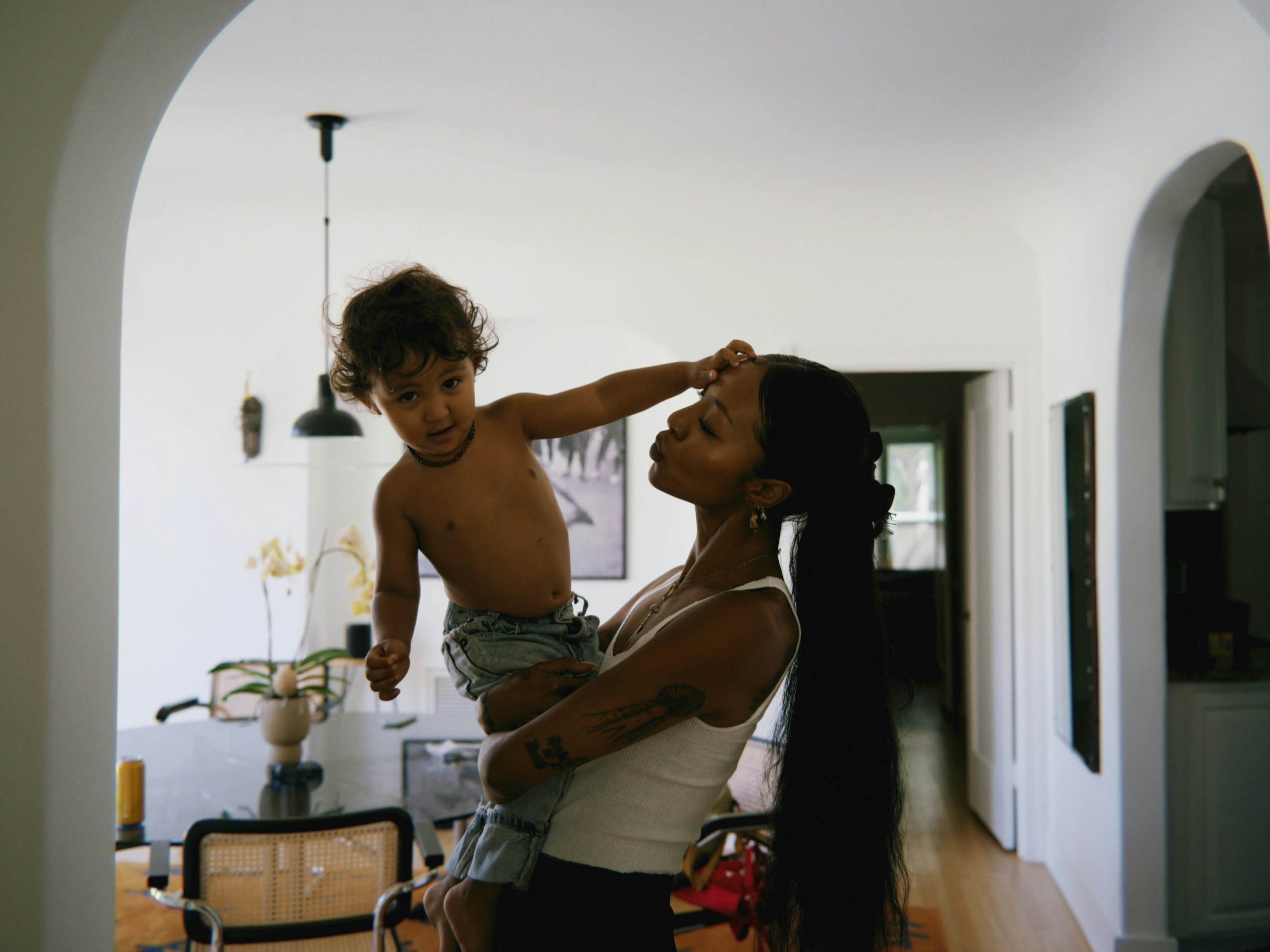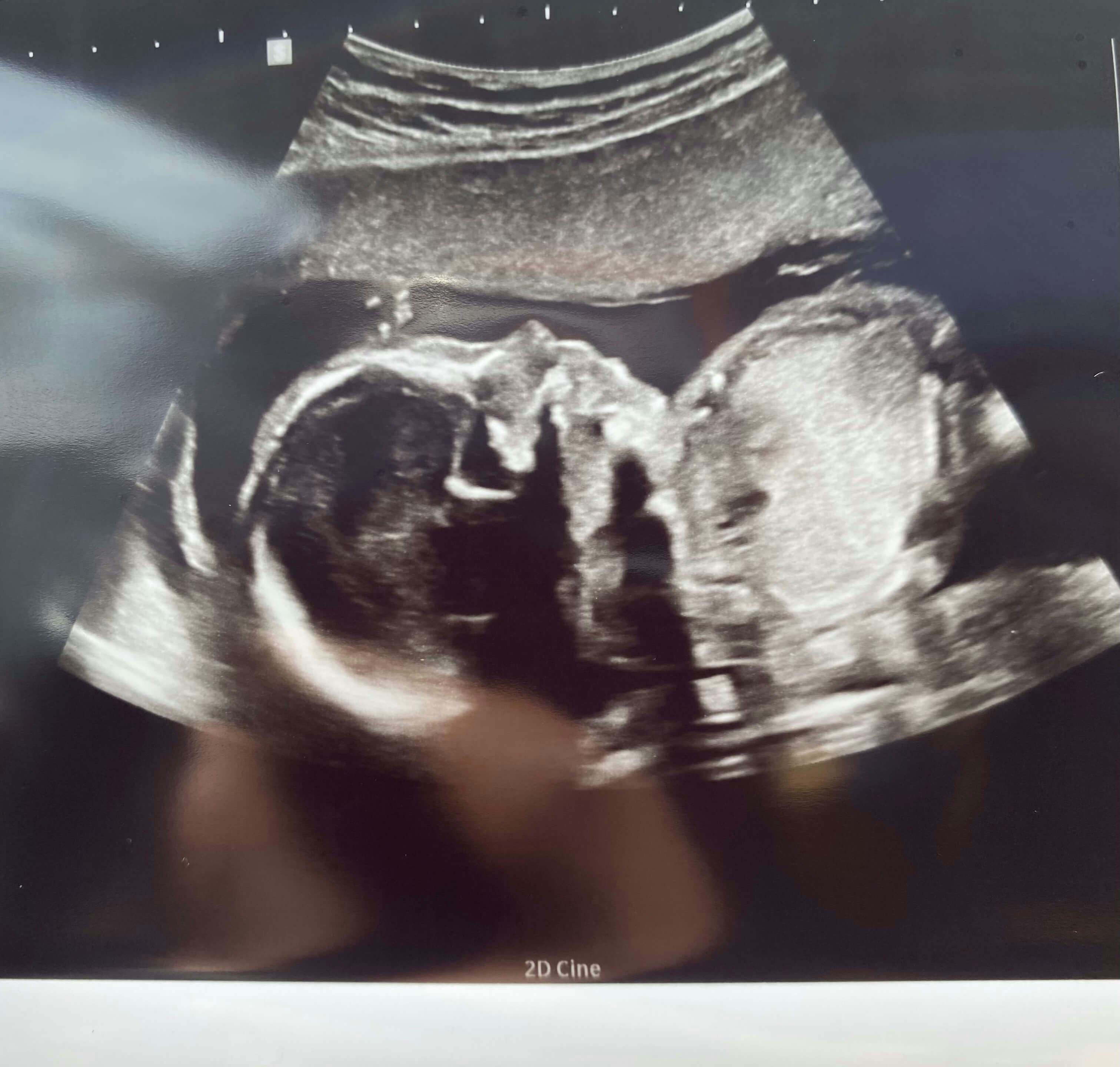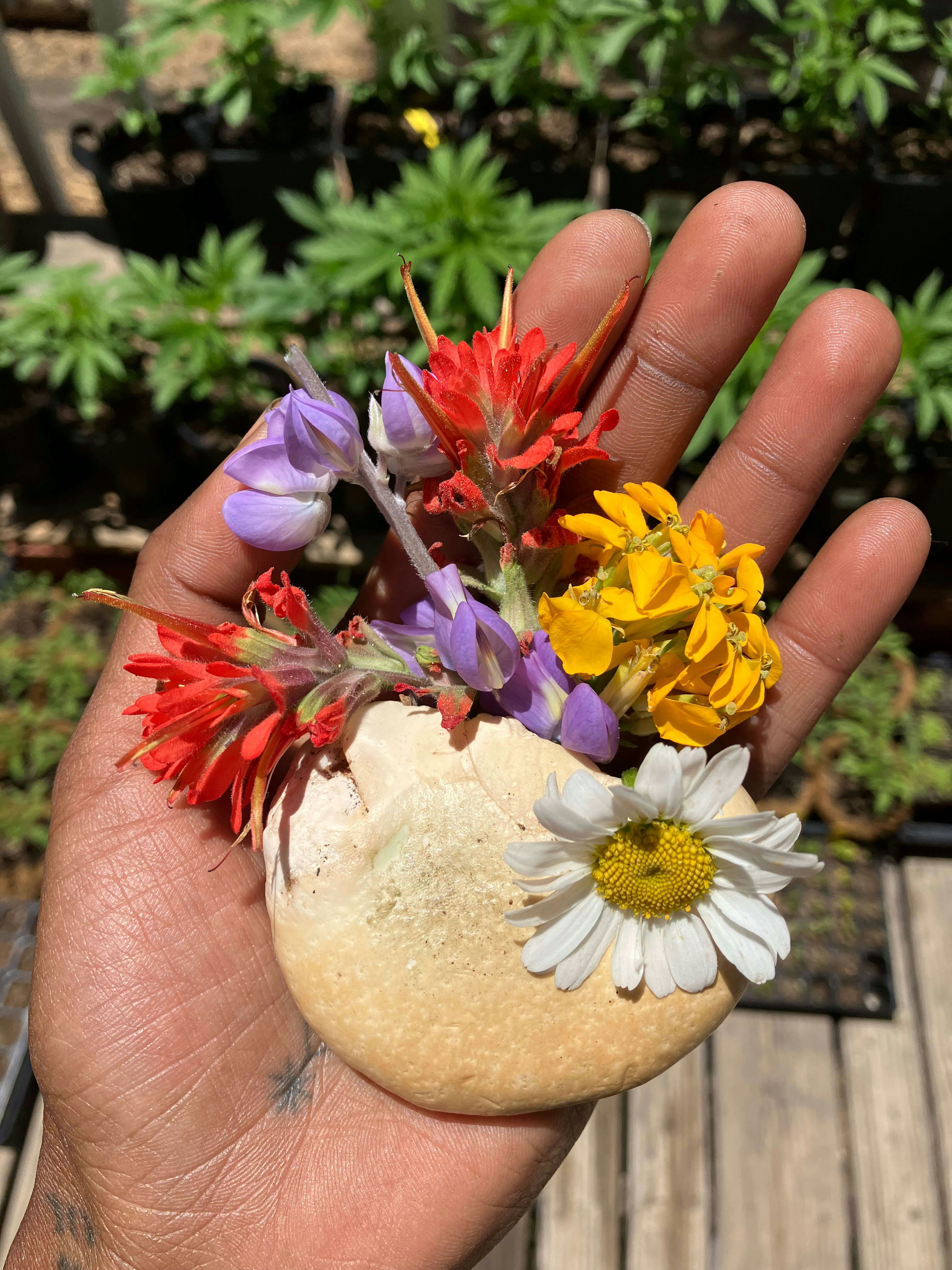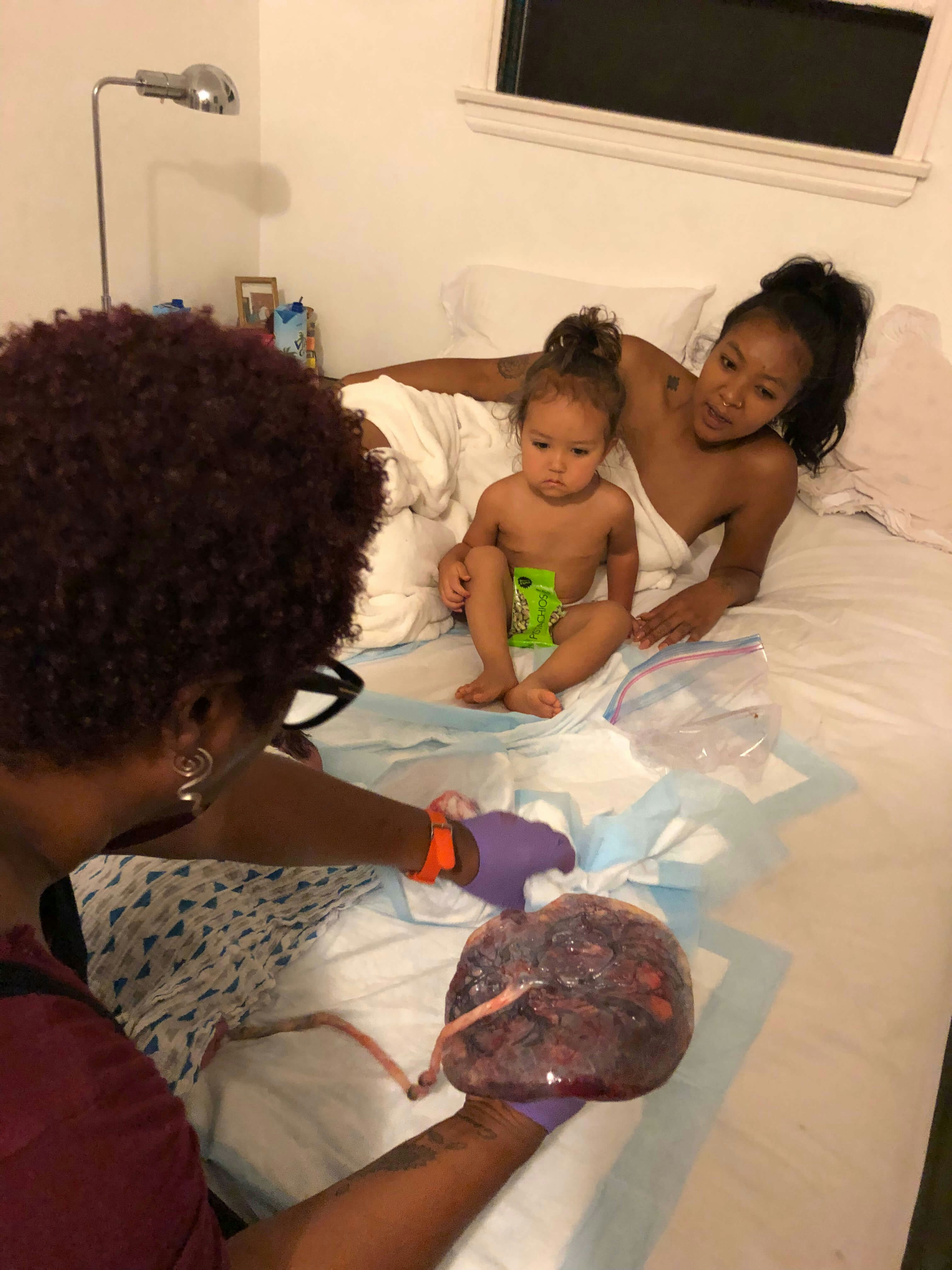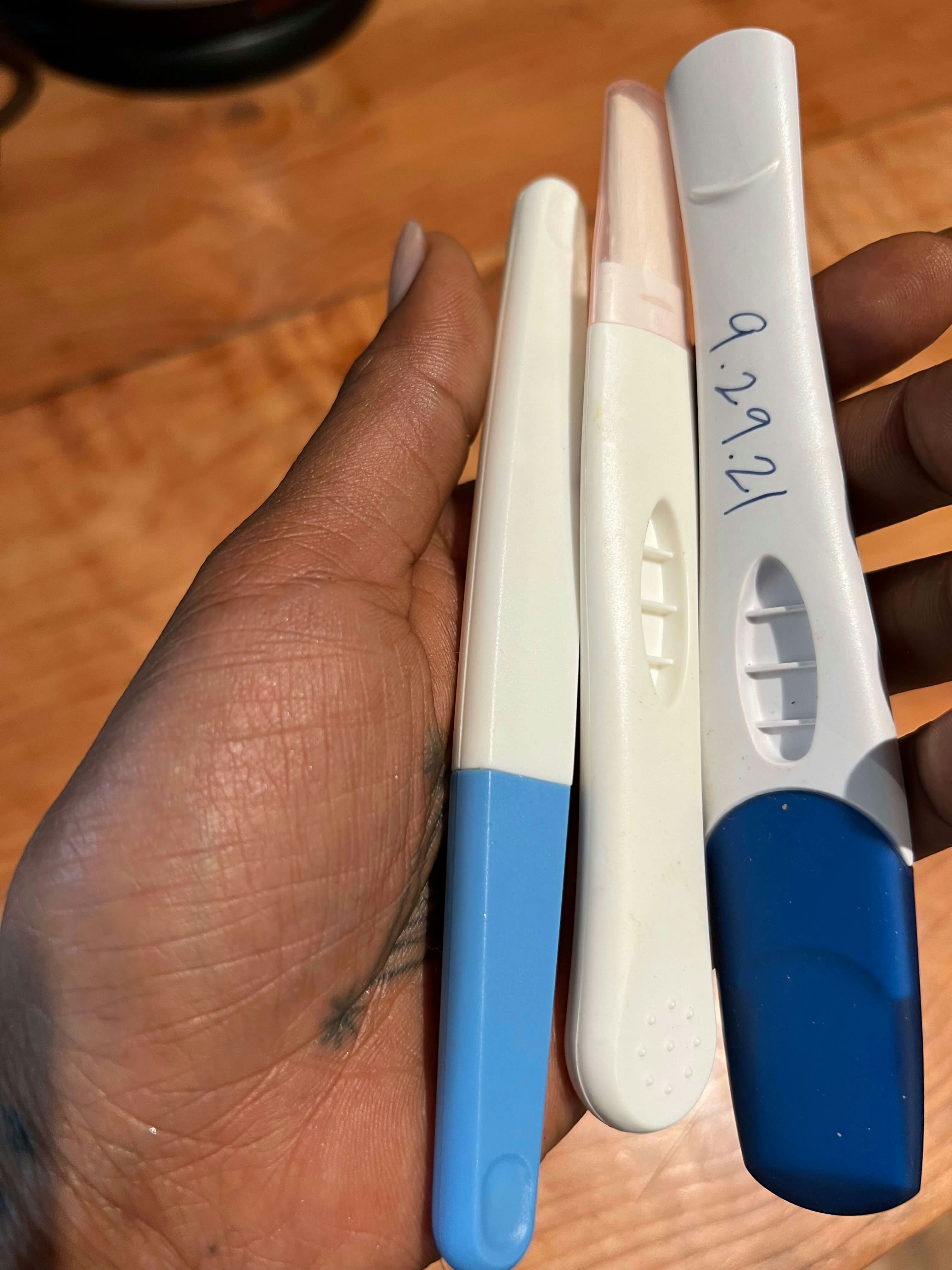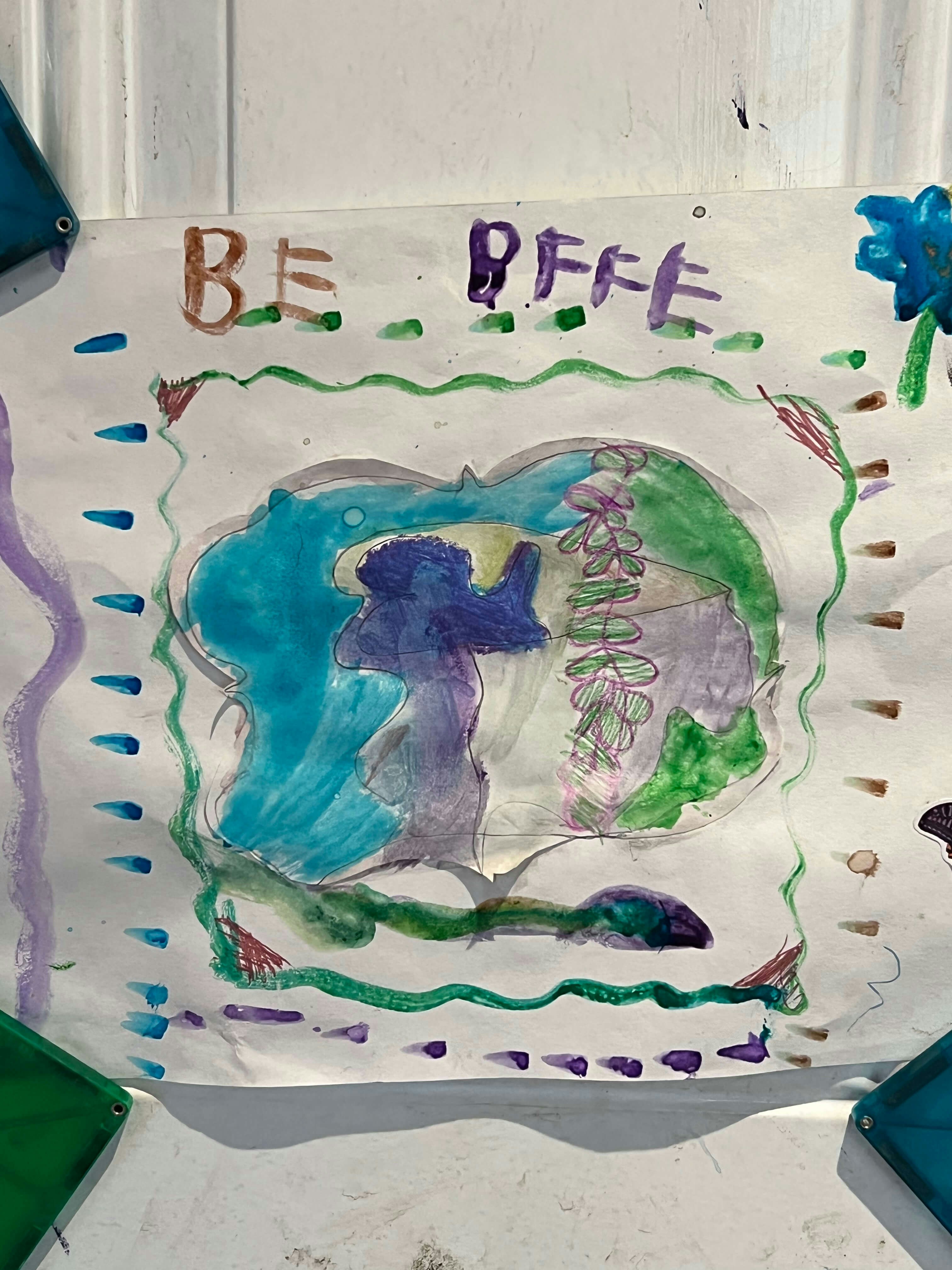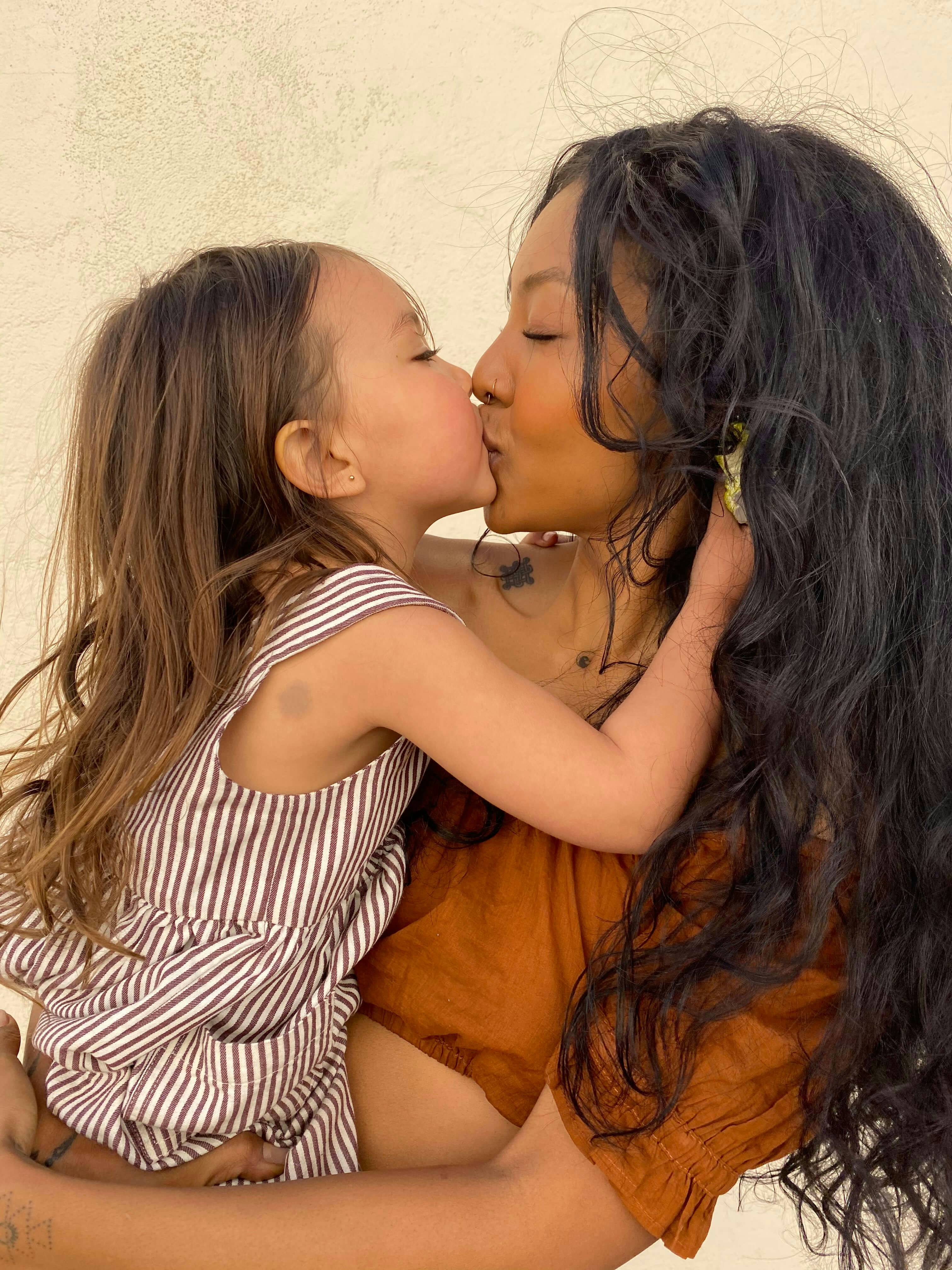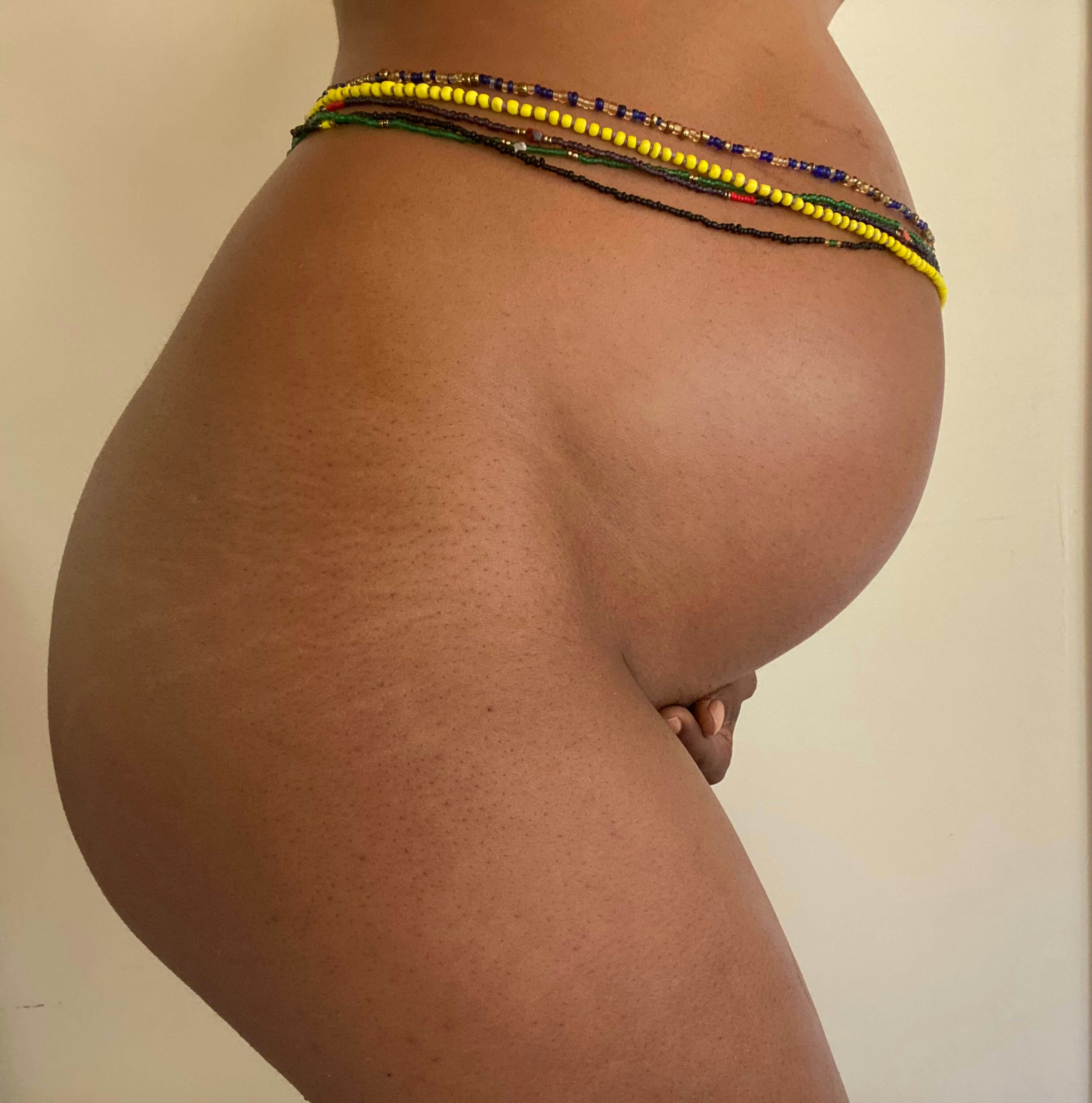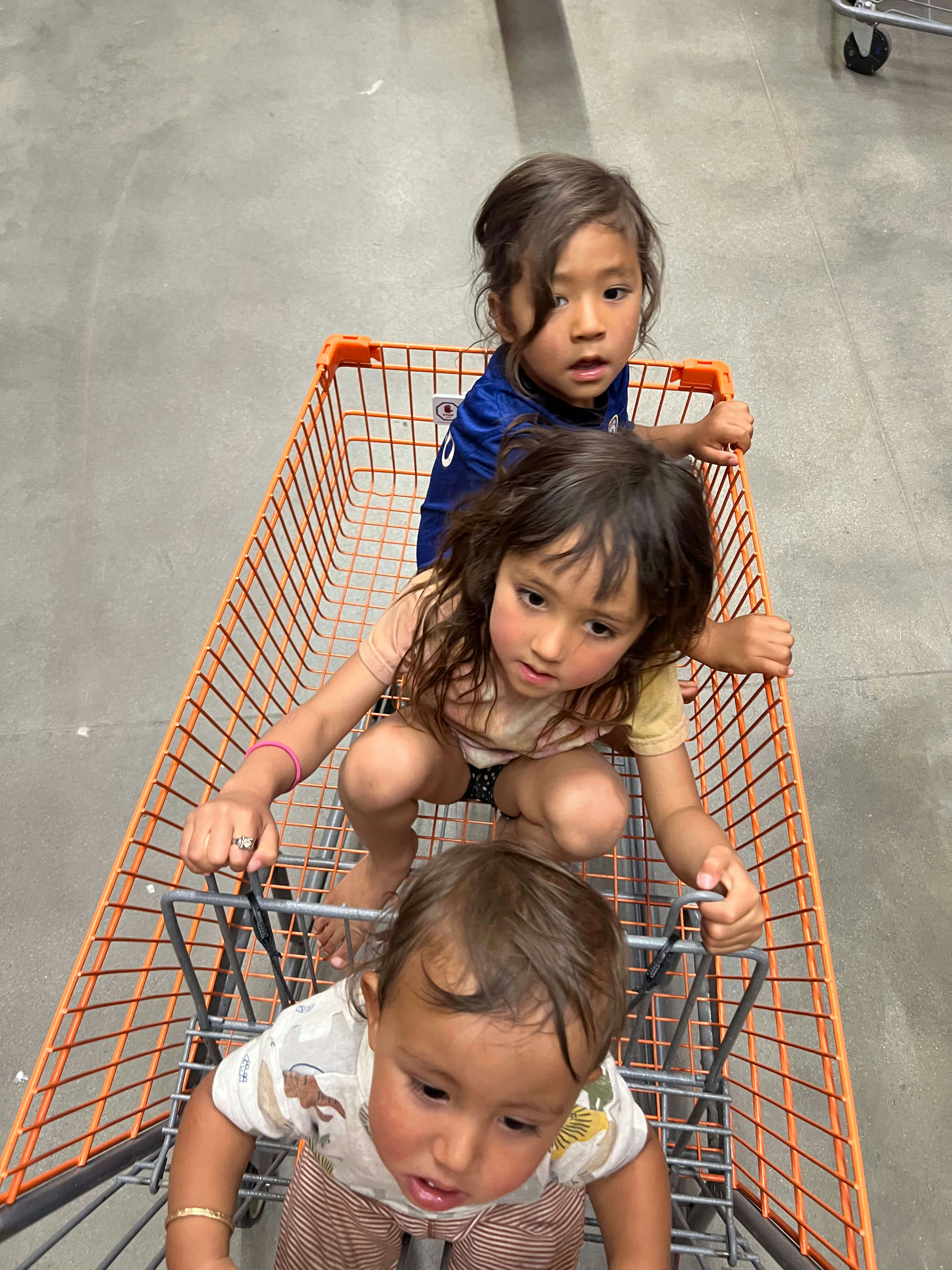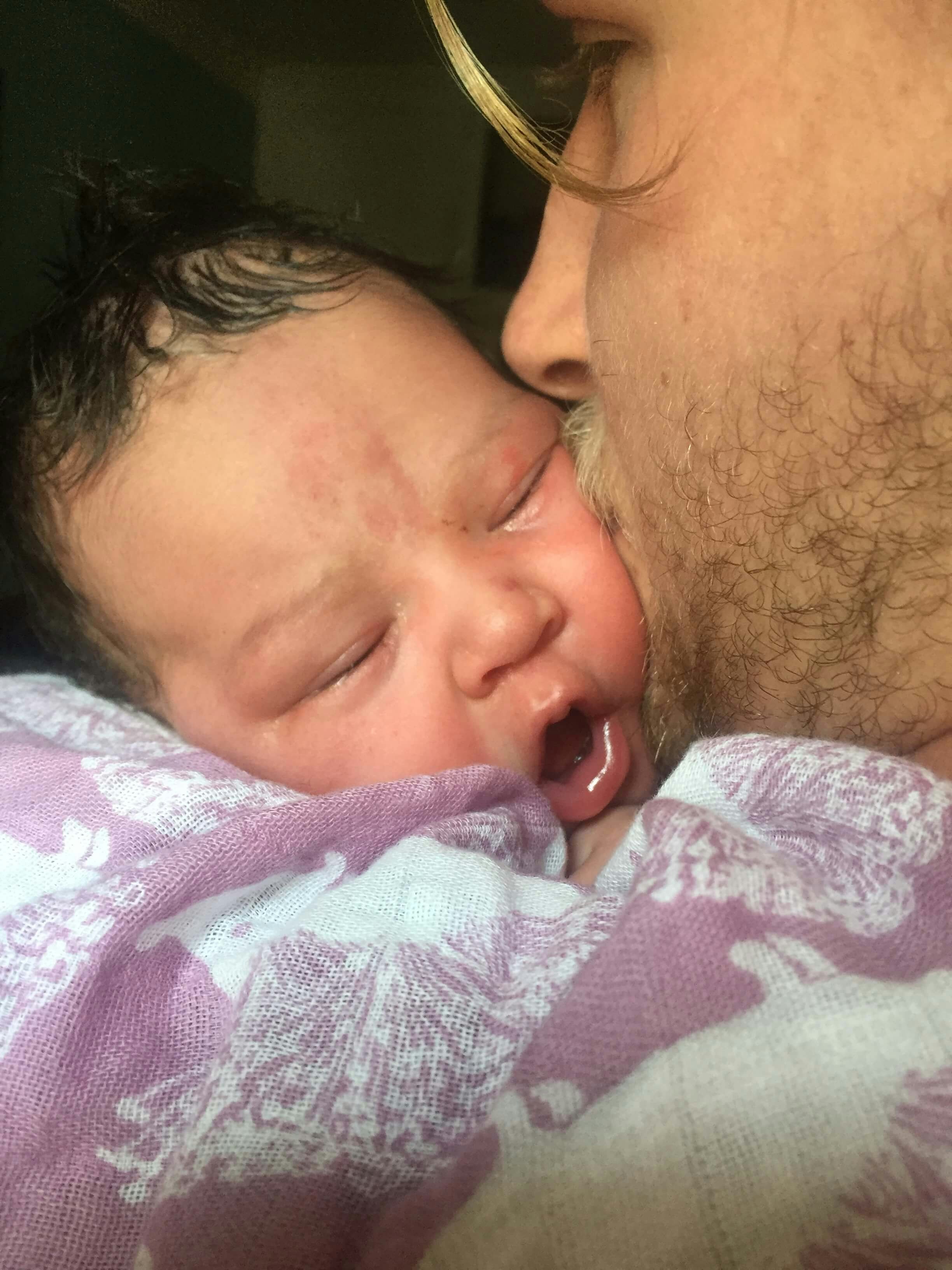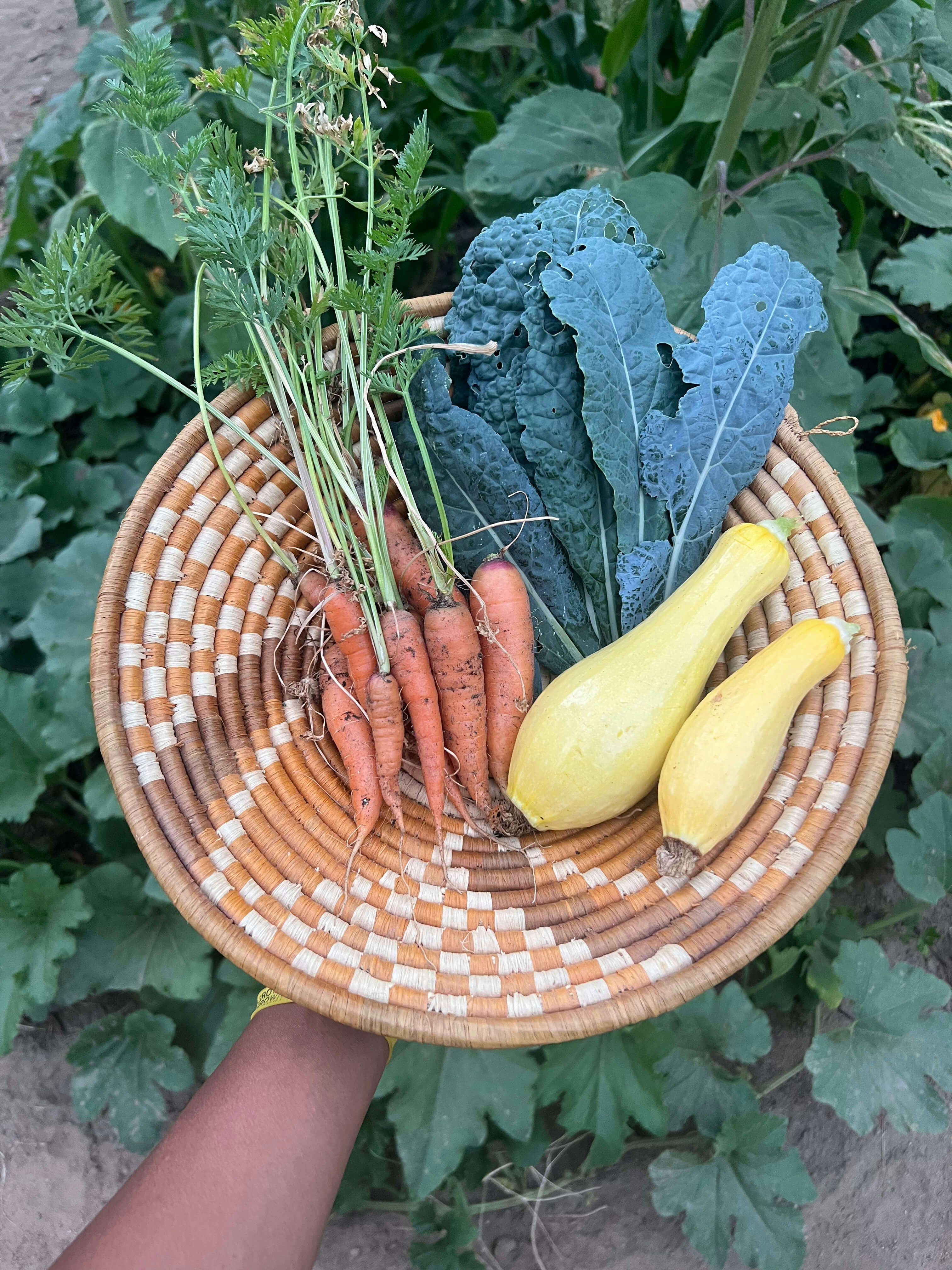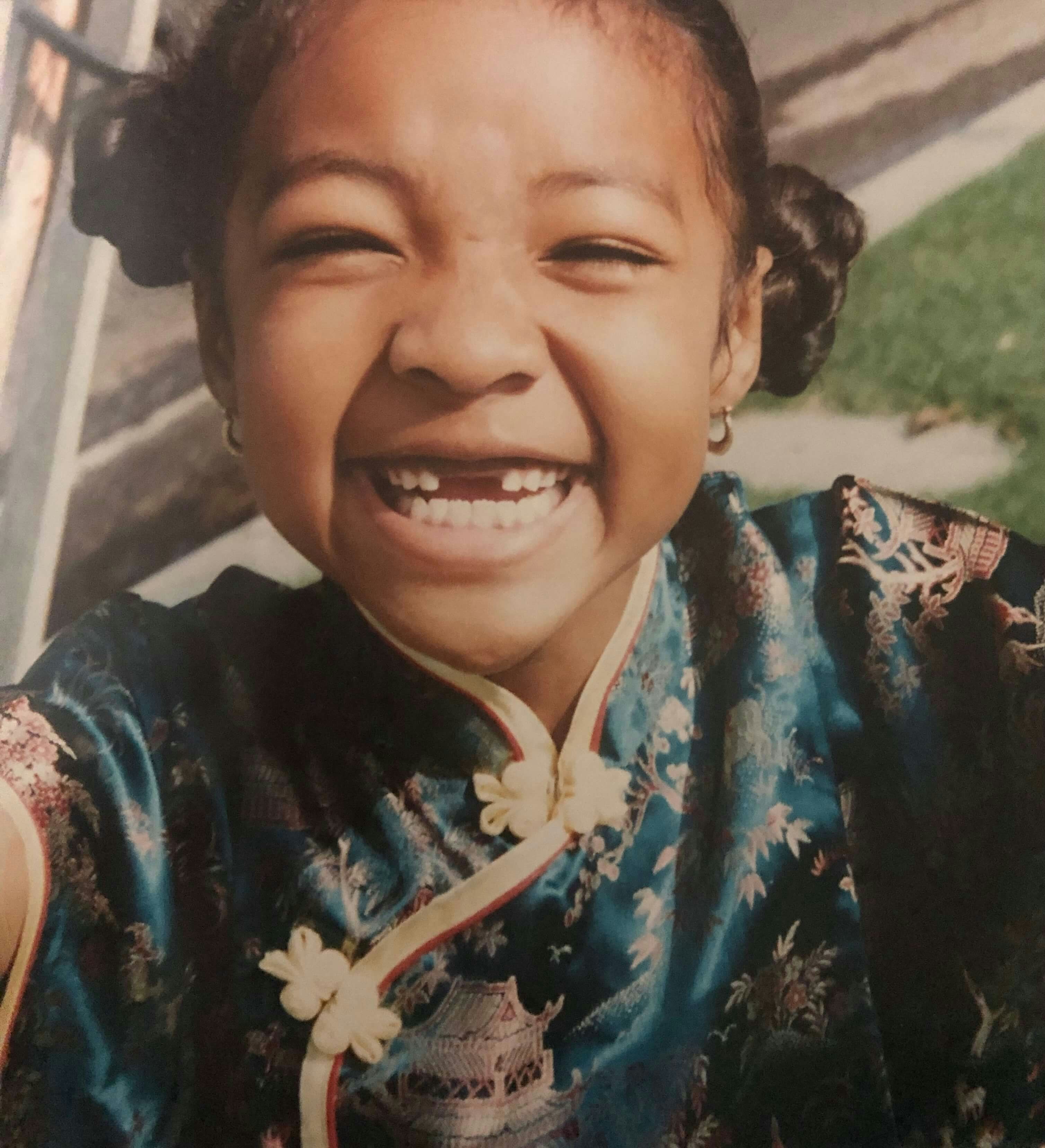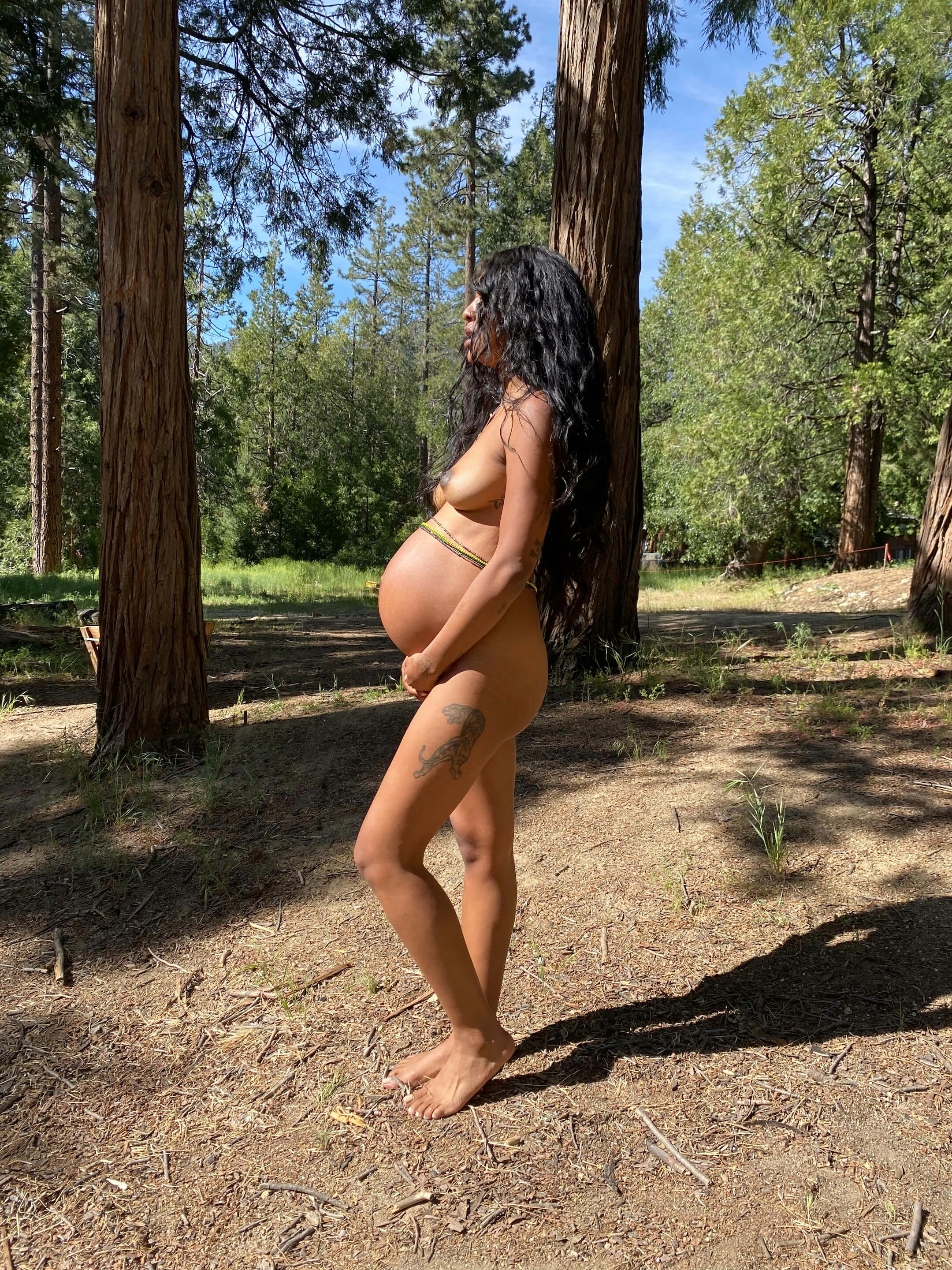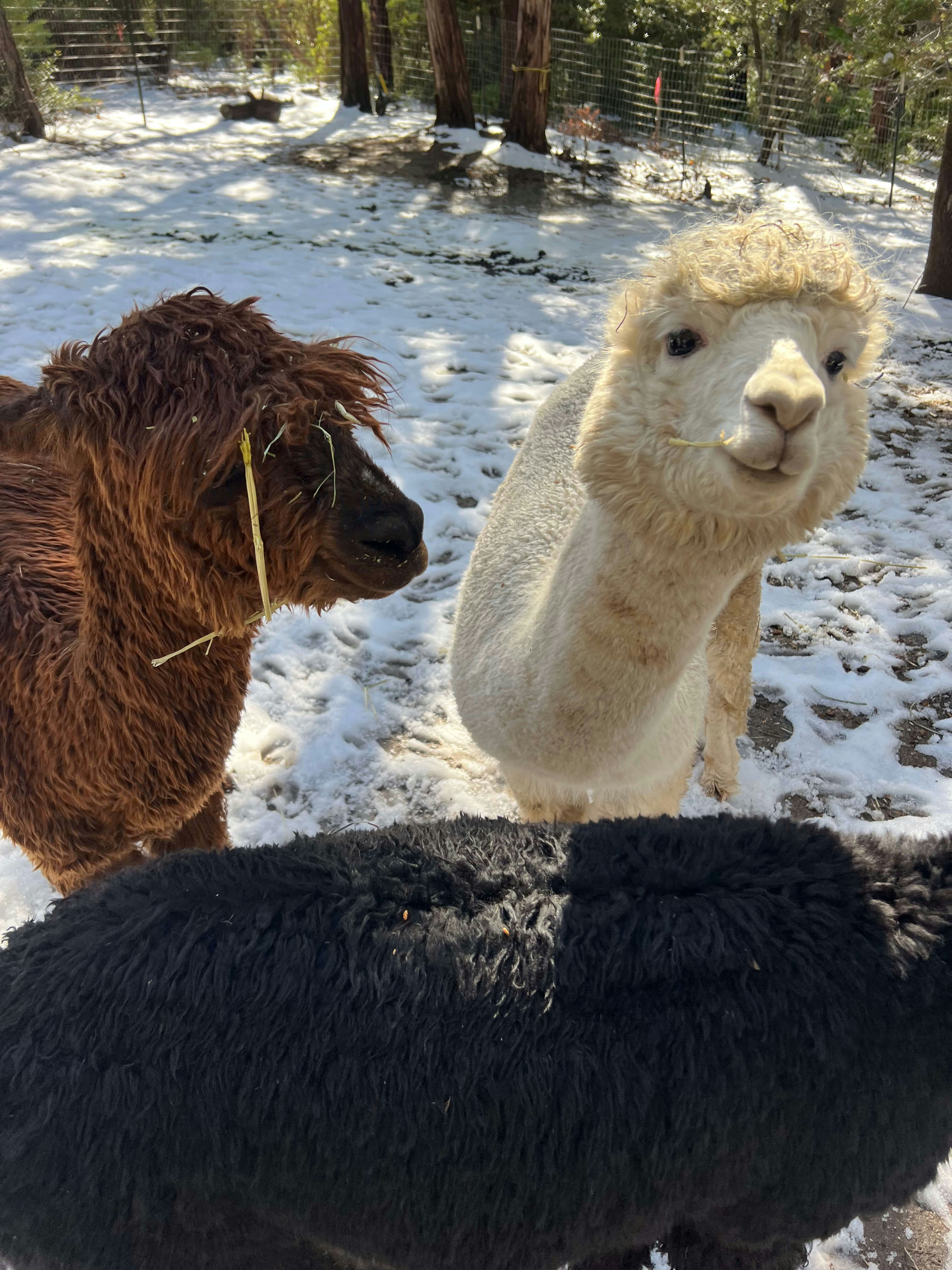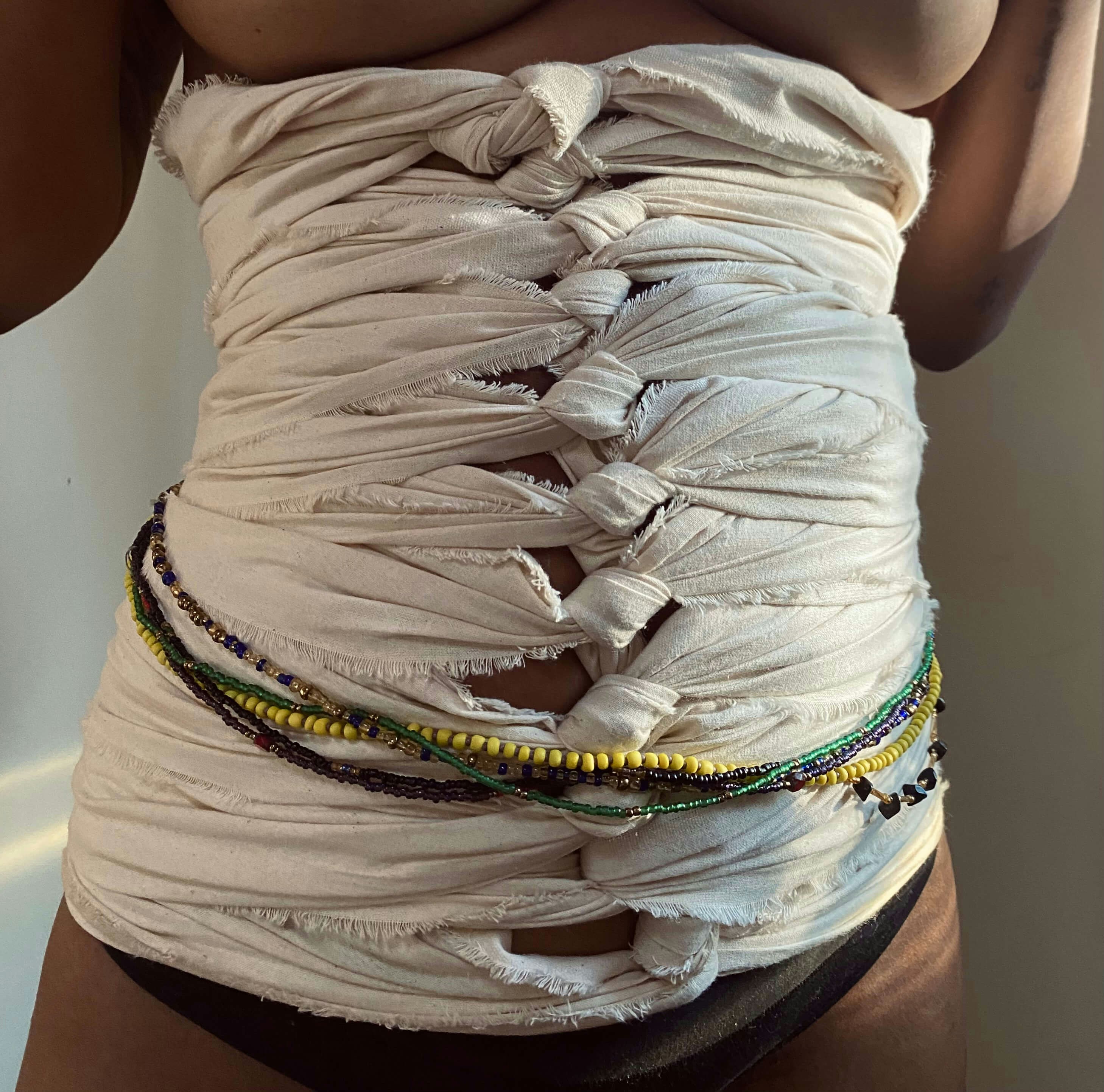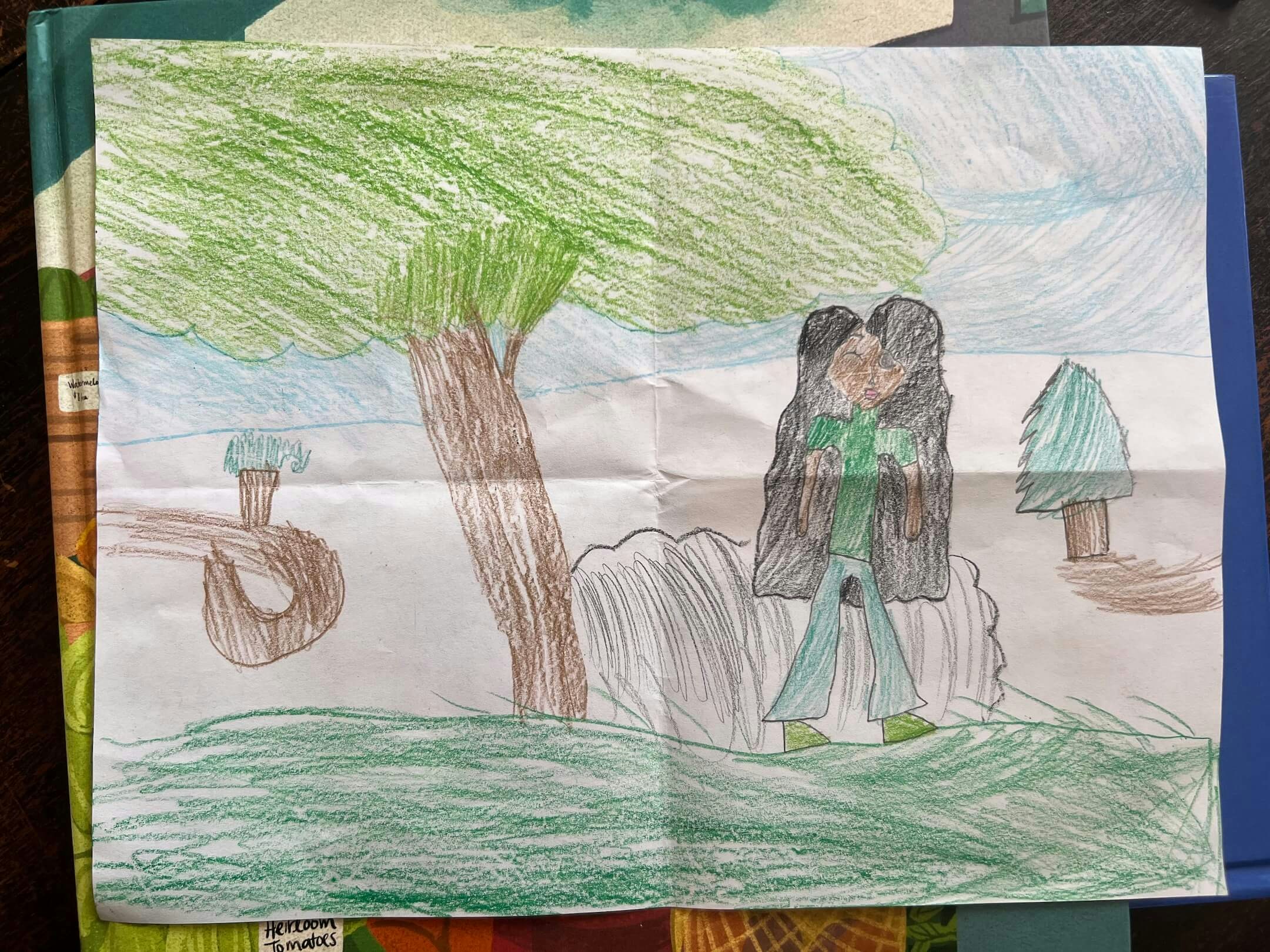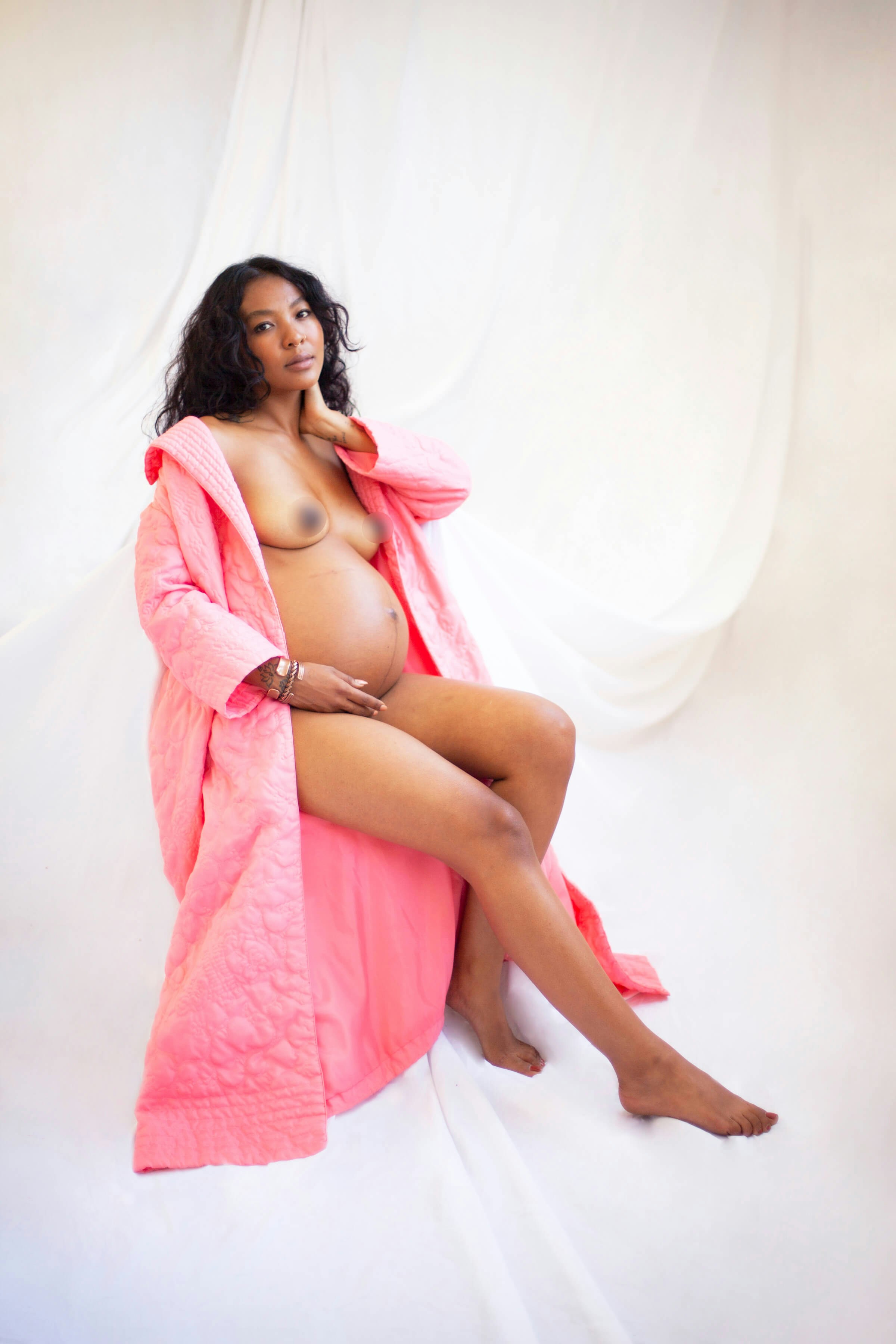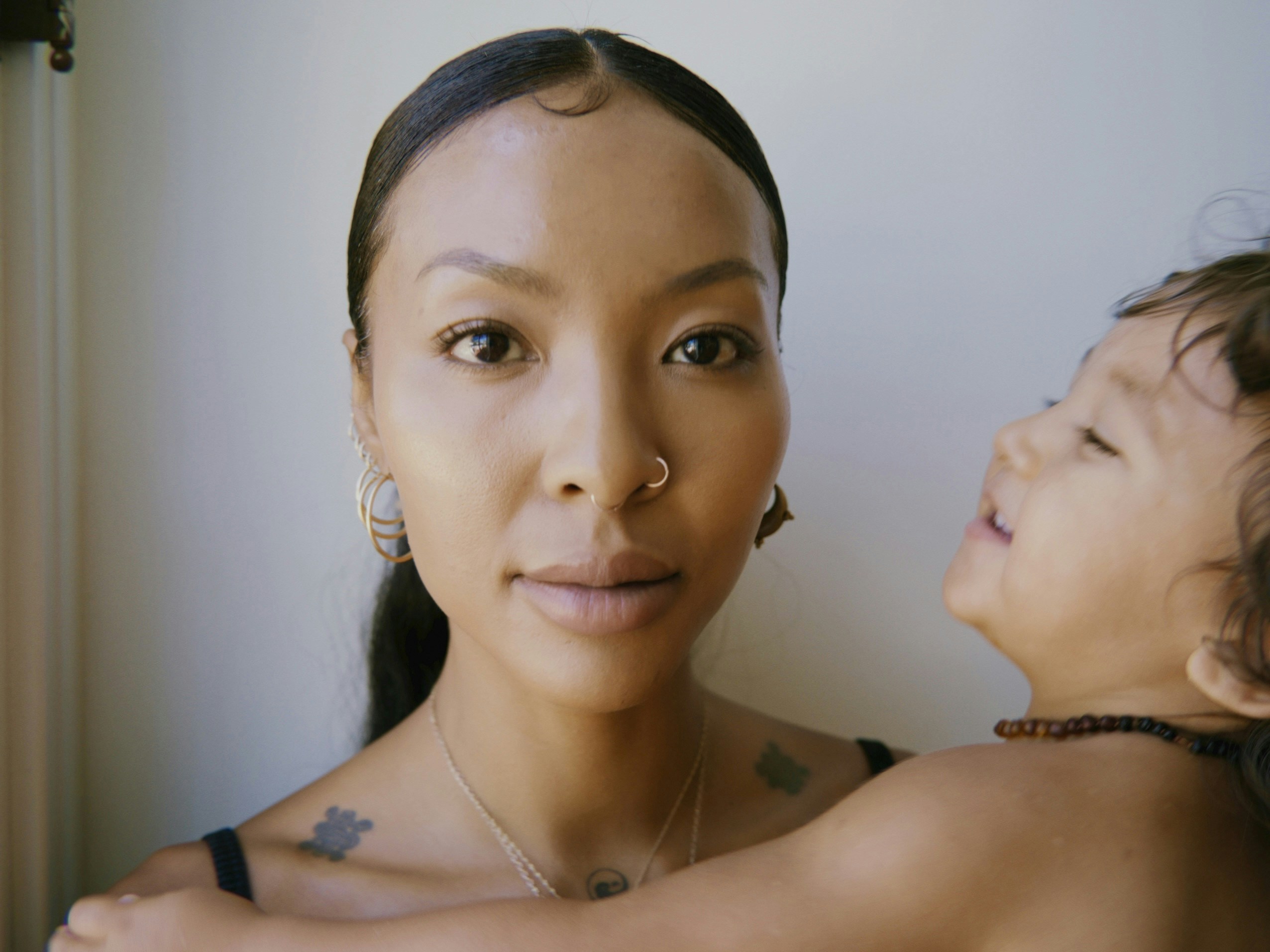
Getting Sticky With: Synmia Rosine
Since becoming pregnant early into her relationship with her now husband, Synmia Rose has been on a profound journey of healing and self-discovery. The process of having her three children (Kyoko, 7; Ossi, 5; and Hakeem, 3) has allowed her to not learn to be their mother but how to mother herself through love, nurture, and forgiveness. Motherhood also led her to discover her calling to birthwork. Now a certified doula and herbalist, she balances her birth practice with homeschooling her children and running a farm in Idlewild, California. Read on as she explains not only the value of transitioning babies Earthside but also how she approaches nurturing babies into thoughtful, responsible humans.
Surprise, we’re pregnant!
My first pregnancy was a surprise. My husband and I were dating after having met years prior and reconnecting. We went to Southeast Asia together early into dating, and in the third month we were in Bali surfing and doing yoga every day and just living our best life, we conceived Kyoko. That cut our trip pretty short. Although that wasn't my first pregnancy, I definitely knew I was going to keep her. Obviously there were larger conversations between me and him. I said, I'm just going to keep her and you can decide the type of father you want to be. We’re married now—it worked out! I think spiritually, I had definitely prepared for a baby. I've always wanted to have a big family, but there were things that I needed to work through. I always wanted to be a mother figure because I didn't have that growing up. I have four siblings but we all have different moms. I was predominantly raised by my dad. He was a single Black man in LA in the 90s, so there really weren't a lot of resources for him. But he made it work and family was everything to him. So I'm blessed that he passed that down to me.
Opening Pandora’s box
I did the best I could to work through all of the trauma associated with my mom, so that I wasn't bringing that into mothering my children. But as you know, no matter how much you work on before you become pregnant, the moment you become pregnant, it opens up a whole Pandora's box of emotions, memories, and things that you may have forgotten. Our brains are so powerful in the way that we experience something super traumatic—it'll shut it off and kind of store it away. For me, pregnancy and becoming a mother has opened up all of the things that I shut away in order to survive. So when I became a mom, it was really difficult. I’ve been working through it. Just the other day my daughter told me she didn’t want to learn French anymore and that she wanted to learn Korean and know more about her heritage. She was asking about her grandmother and her ancestors. And she started asking all the questions. I think it’s important to trickle in stories about my childhood and what it's like growing up without a mother rather than suppress it.

"For me, pregnancy and becoming a mother has opened up all of the things that I shut away in order to survive."


A phoenix rising
My first pregnancy with Kyoko was scary. I think for a lot of women, especially if you’ve experienced body dysmorphia in the past, really being in your body in a non-superficial way is really beautiful—it was for me. I love a phoenix rising moment, so I was taking it all in. I had a relatively easy pregnancy besides little things, like not being able to eat by the time I was 7 months pregnant because she was so big. She was almost 10 pounds whens she was born. For me, my main anxiety with my first pregnancy was where I was going to birth. I wasn't a very internet savvy person, so I wasn't really even aware of options for birthing at home. At the time there were only two black midwives in LA. Hospitals were a source of trauma for me and my family growing up. I've had a lot of death in the family, and a lot of major violent accidents, so going into the hospital was just a no-go. Shopping around and finding a healthcare provider who I could be 100% transparent with about things, who actually cared and wasn’t trying to push a specific agenda, was probably the hardest thing about my pregnancy. We were living in Idlewild at the time, so when it was time to give birth we went down to L.A. to give birth at my mother-in-law’s apartment. I love home births because you are able to really just get into the mode. I'm easily distracted by sounds and commotion. I gave birth in that apartment 44 hours later after four hours of pushing.
"I did the best I could to work through all of the trauma associated with my mom, so that I wasn't bringing that into mothering my children. But, no matter how much you work on yourself, the moment you become pregnant, it opens up a whole Pandora's box of emotions and memories that you may have forgotten."
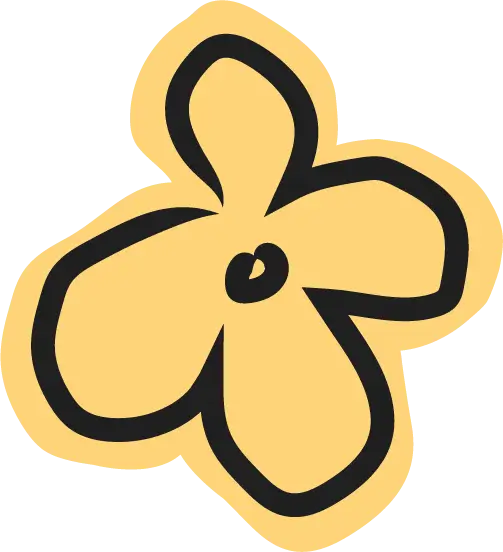
Postpartum: turning pain into progress
My first postpartum experience was miserable, even for it being a home birth. I think there was a lack of preparation… and bless my husband's mom, but she's English and she's from a different era where postpartum wasn’t even a word she was really familiar with. Culturally we are changing so much in this regard, but it is also a trip to see how much we haven't changed. My postpartum experience is what inspired me to be a birth worker and really take that into the course of my life. I wanted to be an herbalist and help folks find natural ways to heal and to be more in tune with their bodies. I realized that none of that's going to work if we have all of these tired, broken families—who are tired and broken for the simple fact that they just need support. People need 30 days of support after they start a new family. They need 30 days of support to help transition into this newness. And I realized, especially for Black mothers, how important that was and how that would benefit all of us. Doula and midwifery kind of took off because I think it was the same sentiment that no matter who you are, no matter where you're from, having babies is really hard and transitioning them into this Earth world is also really hard. So as a way for me to counteract my depression, I just threw myself into birth work. I told my midwife that I’d come to any birth. I was an apprentice for about a year and a half, and then I finally found the program that I certified with, Doula Trainings International. They're based out of New York, and I really love them. They really support the human and give you verbiage on how to support the human, the mother, the non-gendered mother, the same gendered family. They really give us the resources and tools on how to support everyone in this day and age. After that, I kind of found my calling, and then of course I also kept having babies. So the calling kept calling.
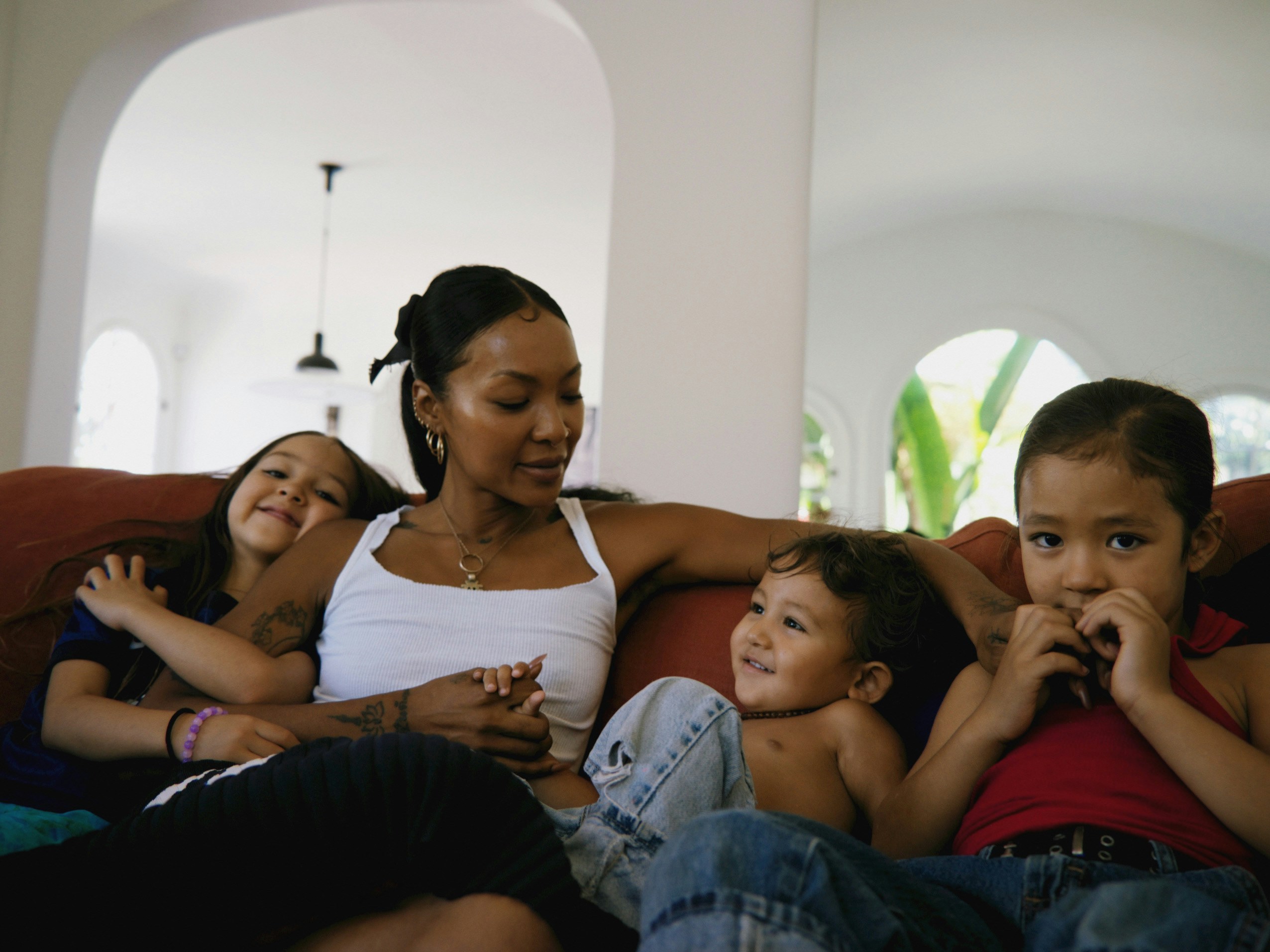
He just slipped right out
All three of my births were very different. After my first experience I was armed with so much information and experience that I was able to honor myself more. I think the hard part of pregnancy, birth, and postpartum is we live in a culture where we're told not to honor ourselves and that sacred rite of passage. But the more we honor ourselves, the more our bodies will tell us what it is that we need. So that's a big part of how I show up in my client spaces and how I've been showing up for myself in these birthing spaces. I mean, to be quite honest, my second was a hard birth for me because he came so fast. He came in maybe an hour and a half—a 10 pound baby rushing through me. Interestingly, I tore with Kyoko and I didn't tear with Ossi, because I was listening to the needs of my body. With Kyoko, as soon as I crowned, I was so exhausted and so tired that my midwife asked me to just take a beat so that the baby can mold to my body. But I was like, no, the beat is over…get this thing out of me. Whereas with O, no matter how much pain that I was in, as soon as I felt the ring of fire, that was my moment to take my big deep breath and wait for the friction to come. I remember letting go of my pelvic floor, and then he just kind of slipped right out. Birth teaches us what we're capable of. Now I know how to lean into that divine strength. What was really interesting about all three of my births is that my gestation period is exactly 42 weeks and a day. It's the latest before California says you need to go into the hospital and induce your baby. I don't know why. My last baby Hakeem came in 22 minutes. My midwife didn't even make it.
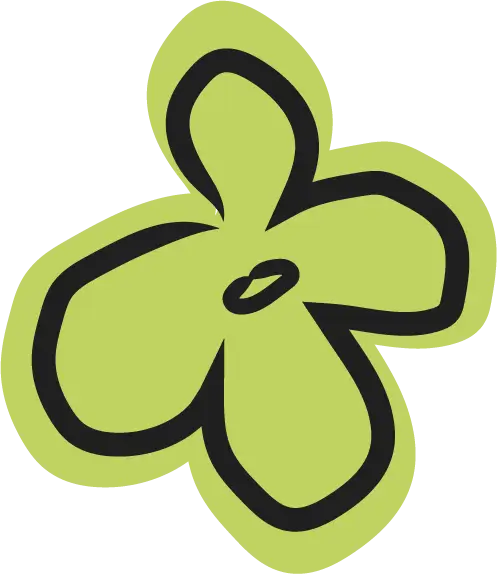
"My postpartum experience is what inspired me to be a birth worker and really take that into the course of my life. I wanted to be an herbalist and help folks find natural ways to heal and to be more in tune with their bodies. I realized that none of that's going to work if we have all of these tired, broken families—who are tired and broken for the simple fact that they just need support."
Why the first 40 days matter
Nourishment, rest, and bonding—these are the three things, the only three things, that you should be focused on for 40 days straight after giving birth. This is really going to be the only time life stops for you. Unfortunately we live in an economy and in a time where we feel like life doesn't stop, but if we take advantage of just those 40 days, we'll really be able to set ourselves up to be less stressed, less overwhelemd, and not live in regret because we didn't sleep in with our kids or we didn't nap when our babies were napping. We have to remember that this baby is the Earthside now. It's bright, it's loud, it's different, and we're regulating our child's nervous system. I think that no matter where you birth or if you have a doula or if you have a huge support system, or if it's just you or if it's just you and your partner, I think physicians and our communities should encourage families to take time to be families and do that in the 40 days. Society tells us to just get right back on the horse, but rushing things feeds into postpartum depression and into a detachment of self from being a mother or your role when your baby's around.



"My husband and I are teaching our kids to invest in the journey and not in the end result—a lot of how we do that is chores. They do chores around the land, they feed the animals, they do hands-on weaving, plant dying, and things that take time. We’re hoping to manifest little independent thinkers."
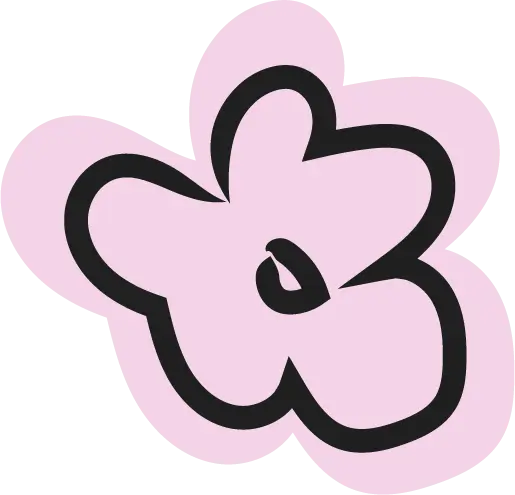
Turning babies into little humans
My children are a little feral. They can't even go to the city, they run wild down the streets and I'm like, you guys, this isn't Idlewild, we aren’t in the mountains - slow down! I'm having to reteach them certain street smarts that we don't necessarily get up here. But as far as the type of parenting that I am trying to implement, I’d say it’s academic forward. My dad taught himself how to read and write. He was very big on academics with me, and I took this parenting masterclass a month ago and I'm finally realizing the type of parent I am. It's a little bit authoritarian; it's a little bit permissive. The goal is to be the balanced parent and raise emotionally balanced children. And so everything I do now is reminding myself of that. Look, you can’t be a gentle parent 100 percent of the time—I have a three and a half year old… the girl is unhinged half the time. If we are always soft-spoken and gentle that really isn't setting our children up for jobs because their boss is not going to gently boss them. Their coworker is not going to gently ask them what to do. People are not gentle when under high stress. So in knowing that, I guess what I want to teach my kids is realness. I'm very real and upfront about what's going on in the world. I'm very real and upfront how conversations should be had and how we should communicate. I teach love, kindness, and respect. And I want to help them find what they want to do. We do have to work for money, and the best way to work for money is by doing something that you love. And having these conversations with my kids now is very important because there’s a generational gap where kids these days aren’t understanding how to make money and just because they thought of an idea and want it to be popular and want to be paid for it all in one breath. There is no working towards it. There's no journey. Yesterday my husband and I were talking about teaching our kids to invest in the journey and not in the end result. So a lot of how we do that is chores. They do chores around the land, they feed the animals. We do a lot of hands-on weaving, plant dying, plant identification, and just things that take time. We’re hoping to manifest little independent thinkers and independent studiers. We don't do iPads in the house. I know that that is a controversy for a lot of families, and rightfully so. It's hard because we're all on our devices and we are all also working. Sometimes our kids are feeling cruddy and just want to zone out for a little bit, which is understandable. We just take it day by day. One reason I really like teaching my kids at home is because they love learning from us. We do flashcards, little match games, mind games, things that they love. It's funny, once they reach four or five, you look in your house and you're like, wow, I've got a bunch of humans in here. No more babies.
